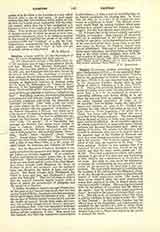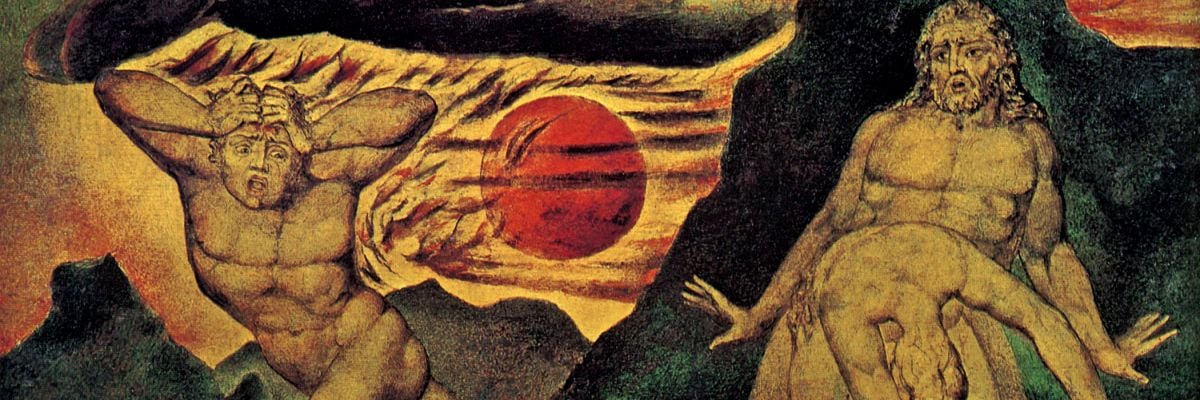

Cainites, a name used for (I) the descendants of Cain, (2) a sect of Gnostics and Antinomians.
(1) The Descendants of Cain.—The Bible (Gen., iv, 17-22) mentions nine of Cain‘s descendants in the direct line: Henoch, Irad, Maviael, Mathusael, and Lamech, who had four children: Jabel and Jubal by his wife Ada, and Tubalcain with his sister Noemi by his second wife Sella. The etymology of several of these names is obscure because it is uncertain whether they are Hebrew, Babylonian, or Sumerian. The derivation of Mathusael, however, is obvious, mutusha-lu being the Babylonian for “vassal of God“. Maviael, if the Septuagint reading is right, would mean “God is my life-giver”; but according to the Hebrew text Mehujael (MCHVYAL) would mean “wiped out by God“. Most likely, however, the word is Babylonian and connected with amet ilu, “man of God“. Lamech is perhaps connected with lamga, the Sumerian for “servant” (of God). Cain “built a city and called the name thereof by the name of his son Henoch“. To some scholars this has suggested “dedication” as the Hebrew derivation of Henoch; but others see in it the name of the famous Sumerian city, Unug (later Uruk, Erech, Warka). For Irad no satisfactory etymology has been found; it means, perhaps, “scion” from arada, “to sprout”. It is remarkable that amongst the Sethites four names occur similar to those of Cainites: Cainan, Mahalael, Jared, and Mathusala, and two, Henoch and Lamech, are identical in both pedigrees. Ada probably means “dawn”, Sella, “shade”, Jabel, “shepherd”, Jubal, “musician”. Noemi means “beautiful”. The Septuagint omits Cain after Jubal, thereby suggesting connection with a tribe of Asia Minor (Gen., x, 2, Ez., xxvii, 13) called Tabalu by Assyrians and Tubar?noi by Herodotus. But the Massoretic Tubalcain (TNKLQYN) is certainly correct if it be connected with Balgin, the Sumerian Vulcan, as recently suggested. If we substitute English equivalents for proper names, Gen., iv, 19-22 would read: “God‘s servant took two wives, the name of the one was Dawn and the name of the other Shade. And Dawn brought forth Shepherd, the father of dwellers in tents and herdsmen and his brother’s name was Musician, the father of harp- and pipe-players. But Shade brought forth Blacksmith, the forger of brass and iron, and Blacksmith’s sister’s name was Beautiful.” This has led some to believe that the inspired narrative merely records under a figure of speech the introduction of polygamy and the spread of civilization.
A similar description existed amongst Phoenicians. As the most recent research has shown that iron was used in Egypt 3500 B.C., no argument for lateness of narrative can be drawn from the mention of iron. As for the six lines of Hebrew poetry (verses 23-24) put into the mouth of Lamech, though their origin and occasion will probably remain forever obscure, their general meaning is clear: Cain had committed deliberate murder, fratricide, yet he was not handed over to the lawless private vengeance of man. How much less was Lamech, who had only committed manslaughter in self-defense, i.e. slain a man for wounding him, or, in Hebrew parallelism, for bruising him. In Num., xxiv, 22, Jud., iv, 11, I Par., ii, 55, Cinites are mentioned as neighbors to Israel. The Hebrew consonants would allow the reading Cainites, which some scholars have adopted against the Massora and Septuagint; but this is at present mere conjecture.
(2) A Gnostic Sect of the second century was called Cainites, or Caianites. They regarded all characters held up to reprobation in the Old Testament as worthy of veneration, as having suffered at the hands of the cruel God of the Jews; hence Cain, as the first man cursed by Hystera, the Demiurg, claimed their special admiration. This sect of Antinomians never found many adherents, and Hippolytus at the beginning of the third century dismisses them with the bare mention of their name. (See Gnosticism.)
J. P. ARENDZEN


